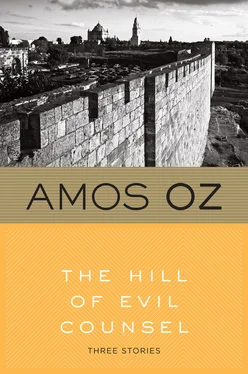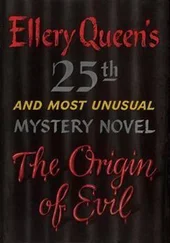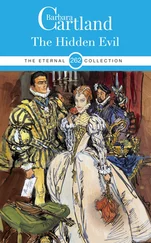I dispelled these thoughts. There was a biblical slogan pinned up on the wall of my classroom that said, THE ADVERSARY AND THE ENEMY SHALL NOT ENTER INTO THE GATES OF THIS CITY. But now the enemy was here in our midst and we were still powerless. It was I who had written in red paint on the wall of the synagogue the words FREEDOM OR DEATH: I could not suddenly give up. Let them come. Let them search. We would withstand the test. And then we would continue the struggle to our last gasp, because we had No Alternative.
Meanwhile, orders kept pouring out in English. The troops invaded the gardens. A light evening breeze stirred, lost its nerve, and retreated. Even the dogs had fallen silent. A reprimand sounded. Perhaps one of the soldiers had made a mistake or been smitten with remorse. Their captain appeared at the end of our lane. He was a stocky, harassed-looking man with sloping shoulders. A short swagger stick danced in his hand. He seemed to be splitting his men up into small teams, changing his mind, and starting all over again. I started preaching inwardly to the captain. Demonstrating what a terrible injustice had been done to the Jewish people. Proving it from the Bible. Telling him about the suffering of the Jews. After all, they were lords of continents and islands, while we had only this tiny patch of land, and we would never budge from it. In those days there was a rumor that somewhere in or around Jerusalem was hiding the commander of the Hebrew Underground, the leader of the Zealots, whom I secretly called the King of Israel. How little we all knew about the commander of the Underground.
Some said one thing, some another.
Once, when Ephraim had just returned from his wanderings, he had deigned to hint to us that the commander could make himself invisible at will by means of a secret scientific trick. Comrade Grill, who was a driver in the Hammekasher bus cooperative, had once testified on oath to the women that one night, when his bus had broken down in the open country south of Jerusalem, between the suburb of Arnona and the kibbutz of Ramat Rahel, just as the bells of Bethlehem were striking midnight a solitary horseman mounted on a magnificent steed had ridden up by the light of the full moon and paused beside him for a moment before galloping off into the distance toward the Hill of Evil Counsel and Mount Zion beyond. He had even addressed Comrade Grill by his first name and said, "Zevulun, do not fear that you are alone tonight. The night is full of warriors."
There were those who maintained that the commander of the Underground was a Jewish general who had been the deputy of the Soviet Marshal Zhukov; he had commanded the successful tank offensive against the Nazi lines in the Rostov area in '44 and had later slipped into Palestine illegally, via the Caucasus and the Levant, to build up the secret Hebrew shadow army.
No one could persuade Mr. Nehamkin to abandon his firmly held opinion: for seven years a superman had been hiding in the ravines of the Judean Desert, herding goats and camels among the clefts in the rock, a seer of visions, swathed darkly in a desert robe like the chief of one of the tribes, sending his battle orders up to Jerusalem with barefoot urchins who were indistinguishable from the Bedouin children. Never, said Mr. Nehamkin, would the British be able to lay their hands on this superman, and he it was who, when the day came, would ascend the throne of the kings of Judah in Jerusalem. Mr. Nehamkin had dedicated some of his poems to him, including the cycle "A Waking Trance," the "Songs of War and Vision," an "Ode to Him That Cometh from Seir," and a short elegy entitled "Steel and Yearning."
Father used to listen politely to all this talk, Comrade Grill's story, Mr. Nehamkin's poems, Mother's playing. But he always suggested that it be treated with cautious skepticism. Who knew? It might be so, or then again it might not. However, in the absence of concrete facts we were entitled to indulge in guesses, and he himself would not withhold his own theory from us: there was no one commander. The old days, Father opined, were dead and buried. There was probably some sort of a committee, a small council, four or five clever Jews, not necessarily young ones, either, presumably planted here and there in perfectly innocent positions, as businessmen, schoolteachers, or pharmacists, while secretly directing the Underground operations. Anybody could be one of them, Father said. We had no means of identifying them. Even the fanciful story of our neighbor Comrade Grill, about the horseman, the broken-down bus, and the moonlight, might be not so much an innocent fantasy as a highly cunning piece of bluff. All in all, he thought, the results spoke for themselves: the British were finding Palestine about as comfortable as a bed of nails, as the saying went. Almost every night our windows rattled and tall flames could be seen in the strongholds of the British administration: Bevingrad, Schneller, Allenby Barracks, Russian Compound, King David Hotel, the secret-police headquarters on Mamiliah Road. They were getting to be like a cat on hot bricks, as the saying went. He doubted if even the High Commissioner slept soundly at night in his palace. The main thing, he thought, was to maintain the right balance between Hebrew zeal and Jewish common sense; we should never lose sight of practicalities, and avoid premature action.
Mother would say:
"Instead of printing greeting cards, your father ought to be a minister in the government."
The poet Nehamkin would add:
"But the hands are the hands of Jacob. You are not very forbearing toward us, Mrs. Kolodny. Forgive us, it is only the misery speaking through our mouths. After all, we have only the best of intentions; why, then, do you judge us so severely?"
They won't get anything out of me, even if they drag me off to the interrogation cells in the Russian Compound. Not even if they burn me with lit cigarettes, just like the Grill boys did to Mrs. Vishniak's parrot. Even if they pull my fingernails out one by one I won't talk. I'll maintain a scornful silence. After all, I am Ephraim's lieutenant. At least, one of his lieutenants. The day before yesterday I spent three whole hours in the workshop, trembling with pride, drawing lines and arrows on a map of Jerusalem to plan the "John of Gischala" operation. Ephraim only gave me very general instructions, as usual:
"Always attack on the flank. Always from the forest. Always from the valleys. From the most unexpected quarter."
He inspected my plans silently, correcting, smiling, making slight changes, adding something here, removing something there, muttering "a brilliant solution," sadly pointing out some careless detail. All at once he was overcome with emotion: he hugged me and stroked my hair and my shoulders and breathed on me, and then suddenly he pushed me away.
Whenever I cried out in the night, Mommy and Daddy both used to get up and make me a glass of hot cocoa and sit on my bed and say, "There, there." Until I calmed down.
Maybe they thought that I should not have been allowed to read The Hound of the Baskervilles. Maybe they suspected that the Grill hooligans were having a bad effect on me. I said nothing, because I had sworn I'd never tell.
8
The twilight was dimming. Only on the windows of the house opposite, traces of blood and fire still blazed. The lane was drenched in shadows. We stood at the living-room window, with Mother leaning on Father's arm and me in the middle in front of them; we looked as though we were posing for a birthday picture for the photographer Mr. Kovacs. We looked out. We waited. We said nothing. Outside, the troops of the Sixth Airborne Regiment split up into small teams and started to enter the houses. Somewhere, far away, a single shot was fired. The Schneller clock began to strike seven. I knew that the clock was never to be trusted, because its hands always stood at three minutes past three. The patches of blood died away in the window opposite; it was dark, but the darkness was still gray, not black, and the sky still seemed to be reflecting distant fires. But we could see no fire, only the remains of the Grill boys' bonfire smoldering smokily.
Читать дальше











